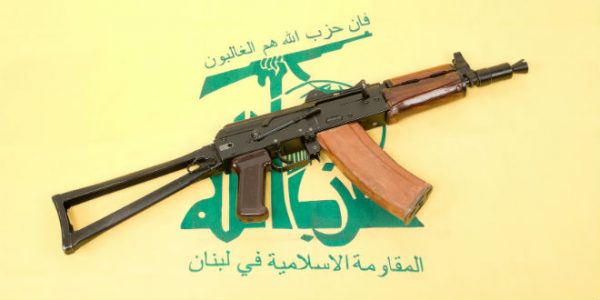 The U.S would have “significant problems” with Hezbollah using ministerial portfolios to funnel funds in support of its “terrorist agenda,” a senior U.S government official said Thursday during a roundtable interview in Beirut.
The U.S would have “significant problems” with Hezbollah using ministerial portfolios to funnel funds in support of its “terrorist agenda,” a senior U.S government official said Thursday during a roundtable interview in Beirut.
Marshall Billingslea, who is currently serving as the Assistant Secretary for Terrorist Financing in the U.S Department of the Treasury, said that his government will keep a close eye on “what role Hezbollah will play” in the upcoming Cabinet, amid mounting concerns that heavy sanctions will be handed down on various Lebanese institutions.
“We are awaiting the formation to see how that will play out,” he said.
The Iranian-backed Hezbollah has all but secured three portfolios in the upcoming government, including the crucial Health Ministry which could see its international funding dwindle if headed by a Hezbollah member.
The U.S plan to curtail Hezbollah’s influence in Lebanon is part of its larger “economic pressure campaign” against the party’s regional sponsor Iran, which has taken its toll on the party’s finances given Tehran’s financial difficulties, Billingslea said.
The U.S has long attempted to root out Hezbollah from Lebanon’s banking sector while some observers fear sanctions would not only impact the party but Lebanon as a whole.
“We are making good progress at driving Hezbollah out of the banking sector,” Billingslea said while calling for legislative reforms to tackle issues posed by “secret bank accounts.”
“The government must have the ability to block and freeze accounts that are associated with Hezbollah’ illicit activities,” Billingslea argued.
Prompted on if the U.S is advocating for the abolishment of Lebanon’s banking secrecy, Billingslea maintained that “confidentiality in banking is essential” yet expressed concern over bank accounts whose true beneficiary remains unknown.
While Billingslea has reiterated his government’s commitment to Lebanon’s financial stability and overall satisfaction with the banking sector’s compliance with U.S sanctions and regulations, he appealed Lebanese officials to ensure that Hezbollah “stays away from the banking sector.”
“They do not need to contaminate the banking sector,” he said, as fears over new sanctions have gained tractions in recent months.
Asked about civil action lawsuits filed by a group of American citizens against 11 Lebanese banks being accused of providing material support to Hezbollah’s “terrorist activities,” Billingslea refrained from commenting on the matter, reiterating that “it’s a civil action.”
Lebanese banks could also find themselves in hot water for merely dealing with Hezbollah ministers and MPs who deposit their government paychecks, he said, calling on “private banks and others to be very cautious about banking any Hezbollah members, regardless of what title they’ve been awarded.”
Coupled with the threat of broadened sanctions on the self-proclaimed “party of God,” Lebanon has also seen its debt to GDP ratio balloon to over 150 percent, while its imports greatly exceed its exports, resulting in a significant trade and balance of payment deficit.
“There are pressing financial and economic issues that need to be addressed,” Billingslea said, maintaining the need for the new government to implement “reforms to tackle corruption” and release part of the $11 billion international aid package aimed at kickstarting Lebanon’s economy.
Lebanese officials have been unable to come to terms over the makeup of the new Cabinet, with the crisis soon entering its ninth month as opposing parties continue bickering over the allocation of shares.
Nasrallah’s personal physician
The new health minister, Jamil Jabbak, is not a member of Hezbollah but is believed to be close to the group’s leader, Hassan Nasrallah, and was his personal physician at one point.
The 30-seat government has seen an increase in the number of ministries affiliated with Hezbollah, which is under tightened sanctions from the U.S.
The group has been affected recently by the U.S. sanctions as well as those imposed on its main backer Iran.
“We applied sanctions on Iran because they refuse to stop their terrorism and refuse to stop their missile launchers and funneling of their activities abroad,” Billingslea was quoted as saying. “And as a result of that, we are actually seeing that Hezbollah here is not getting the paychecks they once enjoyed from the Iranians.”
Hezbollah threw its weight behind Syrian President Bashar Assad’s forces in the civil war that broke out in the neighboring country in 2011, sending its militiamen to fight alongside Syrian government troops, while PM Hariri and his political allies have criticized the group’s intervention, supporting at times the opposition fighting against Assad.
The government is expected to enact reforms that would allow it to unlock around $11 billion in soft loans and grants pledged by international donors at a conference in Paris last year.
Elisa Parisi-Capone, vice president and senior analyst at Moody’s Investors Service, said it expects the new government to implement measures to receive the investment package committed to by international donors last year.
“However, in the context of very weak growth, fiscal consolidation will remain very challenging for the government,” it said.
ANNAHAR/AP

Leave a Reply
You must be logged in to post a comment.